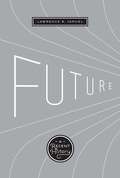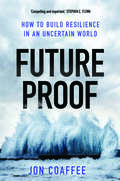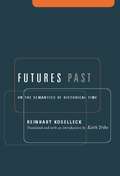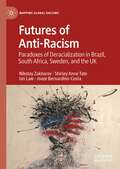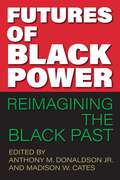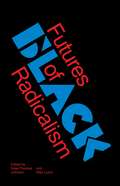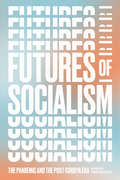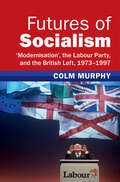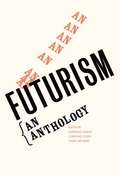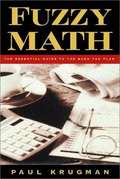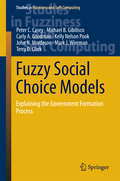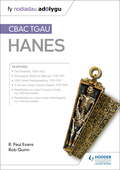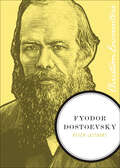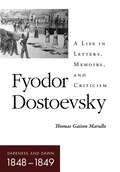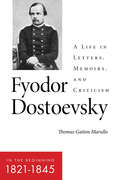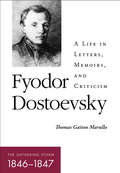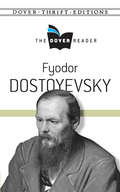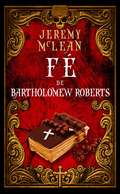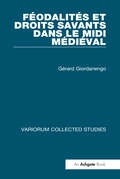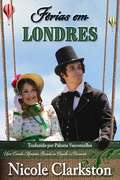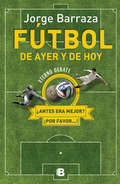- Table View
- List View
Future: A Recent History
by Lawrence R. SamuelThe history of our attitudes toward the possibilities of tomorrow:&“A fascinating trek through American future visions from the 1920s to the present.&” —Lori C. Walters, Ph.D., University of Central Florida The future is not a fixed idea but a highly variable one that reflects the values of those who are imagining it. By studying the ways that visionaries imagined the future—particularly that of America—in the past century, much can be learned about the cultural dynamics of the times. In this social history, Lawrence R. Samuel examines the future visions of intellectuals, artists, scientists, businesspeople, and others to tell a chronological story about the history of the future in the past century. He defines six separate eras of future narratives from 1920 to the present day, and argues that the milestones reached during these years—especially related to air and space travel, atomic and nuclear weapons, the women&’s and civil rights movements, and the advent of biological and genetic engineering—sparked the possibilities of tomorrow in the public&’s imagination, and helped make the twentieth century the first century to be significantly more about the future than the past. The idea of the future grew both in volume and importance as it rode the technological wave into the new millennium, and the author tracks the process by which most people, to some degree, have now become futurists as the need to anticipate tomorrow accelerates.
Futureproof: How to Build Resilience in an Uncertain World
by Jon CoaffeeA compelling and definitive account of why we need to radically rethink our approach to dealing with catastrophic events Catastrophic events such as 9/11, Hurricane Katrina, and the Tohoku "Triple Disaster" of earthquake, tsunami, and nuclear meltdown that hit the eastern seaboard of Japan in 2012 are seen as surprises that have a low probability of occurring but have a debilitating impact when they do. In this eye-opening journey through modern and ancient risk management practices, Jon Coaffee explains why we need to find a new way to navigate the deeply uncertain world that we live in. Examining how governments have responded to terrorist threats, climate change, and natural hazards, Coaffee shows how and why these measures have proven inadequate and what should be done to make us more resilient. While conventional approaches have focused on planning and preparing for disruptions and enhanced our ability to "bounce back," our focus should be on anticipating future challenges and enhancing our capacity to adapt to new threats.
Futures Past: On the Semantics of Historical Time
by Keith Tribe Reinhart KoselleckWith a new, interpretive introduction by the translator, this revised edition of Koselleck's most acclaimed work is once again available in English. Koselleck explores the concept of historical time by posing the question: What kind of experience is opened up by the emergence of modernity? Koselleck explores the concept of historical time by posing the question: what kind of experience is opened up by the emergence of modernity?
Futures Past: On the Semantics of Historical Time (Studies In Contemporary German Social Thought)
by Reinhart KoselleckModernity in the late eighteenth century transformed all domains of European life -intellectual, industrial, and social. Not least affected was the experience of time itself: ever-accelerating change left people with briefer intervals of time in which to gather new experiences and adapt. In this provocative and erudite book Reinhart Koselleck, a distinguished philosopher of history, explores the concept of historical time by posing the question: what kind of experience is opened up by the emergence of modernity? Relying on an extraordinary array of witnesses and texts from politicians, philosophers, theologians, and poets to Renaissance paintings and the dreams of German citizens during the Third Reich, Koselleck shows that, with the advent of modernity, the past and the future became 'relocated' in relation to each other.The promises of modernity -freedom, progress, infinite human improvement -produced a world accelerating toward an unknown and unknowable future within which awaited the possibility of achieving utopian fulfillment. History, Koselleck asserts, emerged in this crucial moment as a new temporality providing distinctly new ways of assimilating experience. In the present context of globalization and its resulting crises, the modern world once again faces a crisis in aligning the experience of past and present. To realize that each present was once an imagined future may help us once again place ourselves within a temporality organized by human thought and humane ends as much as by the contingencies of uncontrolled events.
Futures and Fictions
by Simon O'Sullivan Henriette Gunkell Ayesha HameedFutures and Fictions is a book of essays and conversations that explore possibilities for a different ‘political imaginary’ or, more simply, the imagining and imaging of alternate narratives and image-worlds that might be pitched against the impasses of our neoliberal present. In particular, the book contributes to prescient discussions around decolonization, post-capitalism and new kinds of social movements – exploring the intersections of these with contemporary art practice and visual culture. Contributions range from work on science, sonic and financial fictions and alternative space-time plots to myths and images generated by marginalized and ‘minor’ communities, queer-feminist strategies of fictioning, and the production of new Afro- and other futurisms.
Futures of Anti-Racism: Paradoxes of Deracialization in Brazil, South Africa, Sweden, and the UK (Mapping Global Racisms)
by Nikolay Zakharov Ian Law Shirley Anne Tate Joaze Bernardino-CostaThis book assesses the nature and extent of the project of deracialisation required to counter the contemporary dynamics of racialisation across four varieties of modernity: Sweden, South Africa, Brazil and the UK, based on original research on each of the four country contexts. Since racism began to be recognised or identified as a problem, an assemblage of supra-national initiatives have been devised in the name of combatting, dismantling or reducing it. There has been a recent shift whereby such supra-national bodies move toward embedding strategies against racism within the framework of human rights and devolving such responsibility to other bodies at a national level.The authors bring together a team of international experts in this field, in order to compare the priorities and effectiveness of current strategic approaches in each national context, examining their relationalities and connecting these cases within a joint theoretical and methodological framework. Thus, this book contributes to theoretical knowledge on racialisation and deracialisation, produce a new data set on contemporary interventions and institutions and establish new principles and practice for national projects of deracialisation and anti-racism, building on cross-national learning.
Futures of Black Power: Reimagining the Black Past (Frontiers of the American South)
by Anthony M. Donaldson Jr. Madison W. CatesThis book uncovers and centers unexpected sites of Black Power activism within the Black freedom struggle. In essays interspersed with oral history interviews, leading scholars look at how we study the past and suggest new ways historians can recognize Black Power and Black radicalism in the future.
Futures of Black Radicalism
by Gaye Theresa Johnson Alex LubinWith racial justice struggles on the rise, a probing collection considers the past and future of Black radicalismBlack rebellion has returned. Dramatic protests have risen up in scores of cities and campuses; there is renewed engagement with the history of Black radical movements and thought. Here, key intellectuals—inspired by the new movements and by the seminal work of the scholar Cedric J. Robinson—recall the powerful tradition of Black radicalism while defining new directions for the activists and thinkers it inspires. In a time when activists in Ferguson, Palestine, Baltimore, and Hong Kong immediately connect across vast distances, this book makes clear that new Black radical politics is thoroughly internationalist and redraws the links between Black resistance and anti-capitalism. Featuring the key voices in this new intellectual wave, this collection outlines one of the most vibrant areas of thought today. With contributions from Greg Burris, Jordan T. Camp, Angela Davis, Ruth Wilson Gilmore, Avery F. Gordon, Stefano Harney, Christina Heatherton, Robin D.G. Kelley, George Lipsitz, Fred Moten, Paul Ortiz, Steven Osuna, Kwame M. Phillips, Shana L. Redmond, Cedric J. Robinson, Elizabeth P. Robinson, Nikhil Pal Singh, Damien M. Sojoyner, Darryl C. Thomas, and Françoise Vergès.
Futures of Socialism: The Pandemic and the Post-Corbyn Era
by Grace BlakeleyHow should the left respond to electoral defeat, the leadership of Keir Starmer and a global crisis?British politics is in an extraordinary place. Grace Blakeley introduces an indispensable collection of analysis and comment. In Futures of Socialism, Sam Gindin and James Meadway reassess socialist strategy after the coronavirus; Dalia Gebrial and Siân Errington debate austerity and precarity; Joshua Virasami and Simukai Chigudu explore anti-racism and the legacy of Empire; and Leo Panitch and Momentum co-founder James Schneider probe the limits of parliamentary socialism. Chris Saltmarsh assesses the prospects for an eco-socialist Green New Deal and Cat Hobbs argues for the ongoing centrality of public ownership to socialist policy. Futures of Socialism takes an in-depth look at the reasons for Labour&’s 2019 election defeat, with Unite&’s Andrew Murray on Labour&’s Brexit position, Tom Mills on the British media, Gargi Bhattacharyya and Jeremy Gilbert on better ways to build a political project, and Keir Milburn on generation left. The anthology also compares the fortunes of the British left with socialist movements overseas, in despatches from Europe and America. Blakeley draws on the talents of all sections of the post-Corbyn left to survey the prospects of &“a movement that has dominated the horizons of our lives.&”
Futures of Socialism: ‘Modernisation', the Labour Party, and the British Left, 1973–1997 (Modern British Histories)
by Colm MurphyThe transformation of the Labour Party by 1997 is among the most consequential political developments in modern British history. Futures of Socialism overhauls the story of Labour's modernisation and provides an innovative new history. Diving into the tumultuous world of the British left after 1973, rocked by crushing defeats, bitter schisms, and ideological disorientation, Colm Murphy uncovers competing intellectual agendas for modern socialism. Responding to deindustrialisation, neoliberalism, and constitutional agitation, these visions of 'modernisation' ranged across domestic and European policy and the politics of class, gender, race, and democracy. By reconstructing the sites and networks of political debate, the book explains their changing influence inside Labour. It also throws new light on New Labour, highlighting its roots in this social-democratic intellectual maelstrom. Futures of Socialism provides an essential analysis of social democracy in an era of market liberalism, and of the ideas behind a historic political reconstruction that remains deeply controversial today.
Futurism: An Anthology
by Lawrence Rainey Christine Poggi Laura WittmanIn 1909, F. T. Marinetti published his incendiary Futurist Manifesto, proclaiming, "We stand on the last promontory of the centuries!!" and "There, on the earth, the earliest dawn!" Intent on delivering Italy from "its fetid cancer of professors, archaeologists, tour guides, and antiquarians," the Futurists imagined that art, architecture, literature, and music would function like a machine, transforming the world rather than merely reflecting it. But within a decade, Futurism's utopian ambitions were being wedded to Fascist politics, an alliance that would tragically mar its reputation in the century to follow. Published to coincide with the 100th anniversary of the founding of Futurism, this is the most complete anthology of Futurist manifestos, poems, plays, and images ever to be published in English, spanning from 1909 to 1944. Now, amidst another era of unprecedented technological change and cultural crisis, is a pivotal moment to reevaluate Futurism and its haunting legacy for Western civilization.
Fuzzy Math: The Essential Guide to the Bush Tax Plan
by Paul Krugman"This book puts Paul Krugman's analysis, and powers of explanation firmly at the center of the debate about what to do with more than $5 trillion." "The United States will soon decide how to spend what is forecast as a $5.6 trillion surplus. President George W. Bush has already sent his proposed tax cuts to Congress. Democrats have countered with their own initiatives. The question of whether to enact tax cuts has shifted to when? and by how much?" "This book, dissects the Bush and other tax proposals and shows us who wins, who loses, and how quickly the tax cuts will consume the surplus."--BOOK JACKET.
Fuzzy Social Choice Models
by Peter C. Casey Michael B. Gibilisco Carly A. Goodman Kelly Nelson Pook John N. Mordeson Mark J. Wierman Terry D. ClarkThis book explores the extent to which fuzzy set logic can overcome some of the shortcomings of public choice theory, particularly its inability to provide adequate predictive power in empirical studies. Especially in the case of social preferences, public choice theory has failed to produce the set of alternatives from which collective choices are made. The book presents empirical findings achieved by the authors in their efforts to predict the outcome of government formation processes in European parliamentary and semi-presidential systems Using data from the Comparative Manifesto Project (CMP), the authors propose a new approach that reinterprets error in the coding of CMP data as ambiguity in the actual political positions of parties on the policy dimensions being coded. The range of this error establishes parties' fuzzy preferences. The set of possible outcomes in the process of government formation is then calculated on the basis of both the fuzzy Pareto set and the fuzzy maximal set, and the predictions are compared with those made by two conventional approaches as well as with the government that was actually formed. The comparison shows that, in most cases, the fuzzy approaches outperform their conventional counterparts.
Fw 190 Defence of the Reich Aces
by John WealThis title is the natural conclusion to the collection of titles chronicling the exploits of the fighter pilots of the German Luftwaffe of World War 2 that has been part of - and contributed in some small measure to the success of - Osprey's long running Aircraft of the Aces series. Since the first appearance of Aircraft of the Aces 2 back in 1994, a further ten titles by various authors have been published on German fighters and their pilots. Together, these provide a comprehensive and unique overview of all the famous names (together with some lesser-known ones) who flew fighters 'for the other side' during the war . . . all, that is, except for one final category - those who were operationally on the Focke-Wulf Fw 190 in the defense of their own homeland during the later stages of the conflict from mid 1942 to May 1945. There has not been a work in either English or German - to the writer's knowledge - that deals specifically with this particular subject. Combining a selection of previously unpublished black and white photographs and color profiles, it admirably fulfills two roles - standing on its own, it provides something entirely new for the aviation historian and/or modeler, while as part of Osprey's Aircraft of the Aces collection, it closes the one remaining gap in the coverage of the Luftwaffe's World War 2 fighter pilots and their frontline operations.
Fy Nodiadau Adolygu: CBAC TGAU Hanes (My Revision Notes (PDF))
by R. Paul Evans Rob QuinnExam board: WJECLevel: GCSESubject: HistoryFirst teaching: September 2017First exams: Summer 2019Target success in WJEC GCSE History with this proven formula for effective, structured revision. Key content coverage is combined with exam preparation tasks and practical tips to create a revision guide that students can rely on to review, strengthen and test their knowledge.With My Revision Notes every student can:- Plan and manage a successful revision programme using the topic-by-topic planner- Consolidate subject knowledge by working through clear and focused content coverage- Test understanding and identify areas for improvement with regular revision tasks- Improve exam technique through practice questions and tips from an expert author, teacher and examiner- Get exam ready with extra quick quizzes and answers to the practice questions available online- Learn and use key terms for each topicThis revision guide covers the following studies:- The Elizabethan Age, 1558-1603- Depression, War and Recovery, 1930-1951- Germany in Transition, 1919-1939- The USA: A Nation of Contrasts, 1910-1929- Changes in Health and Medicine in Britain, c1340 to the present day- Changes in Crime and Punishment in Britain, c1500 to the present dayPlease note: this is a Welsh-language edition
Fy Nodiadau Adolygu: CBAC TGAU Hanes (My Revision Notes)
by R. Paul Evans Rob QuinnExam board: WJECLevel: GCSESubject: HistoryFirst teaching: September 2017First exams: Summer 2019Target success in WJEC GCSE History with this proven formula for effective, structured revision. Key content coverage is combined with exam preparation tasks and practical tips to create a revision guide that students can rely on to review, strengthen and test their knowledge.With My Revision Notes every student can:- Plan and manage a successful revision programme using the topic-by-topic planner- Consolidate subject knowledge by working through clear and focused content coverage- Test understanding and identify areas for improvement with regular revision tasks- Improve exam technique through practice questions and tips from an expert author, teacher and examiner- Get exam ready with extra quick quizzes and answers to the practice questions available online- Learn and use key terms for each topicThis revision guide covers the following studies:- The Elizabethan Age, 1558-1603- Depression, War and Recovery, 1930-1951- Germany in Transition, 1919-1939- The USA: A Nation of Contrasts, 1910-1929- Changes in Health and Medicine in Britain, c1340 to the present day- Changes in Crime and Punishment in Britain, c1500 to the present dayPlease note: this is a Welsh-language edition
Fyodor Dostoevsky (Christian Encounters)
by Peter J. LeithartIn his twenties, Fydor Dostoevsky, son of a Moscow doctor, graduate of a military academy, and rising star of Russian literature, found himself standing in front of a firing squad, accused of subversive activities against the Russian Tsar. Then the drums rolled, signaling that instead he was to be exiled to the living death of Siberia. Siberia was so cold the mercury froze in the thermometer. In prison, Dostoevsky was surrounded by murderers, thieves, parricides, and brigands who drank heavily, quarreled incessantly, and fought with horrible brutality. However, while "prisoners were piled on top of each other in the barracks, and the floor was matted with an inch of filth," Dostoevsky learned a great deal about the human condition that was to impact his writing as nothing had before. To absorb Dostoevsky's remarkable life in these pages is to encounter a man who not only examined the quest of God, the problem of evil, and the suffering of innocents in his writing but also drew inspiration from his own deep Christian faith in giving voice to the common people of his nation... and ultimately the world.
Fyodor Dostoevsky–Darkness and Dawn: A Life in Letters, Memoirs, and Criticism (NIU Series in Slavic, East European, and Eurasian Studies)
by Thomas Gaiton MarulloFyodor Dostoevsky—Darkness and Dawn (1848–1849), the third and final volume on the writer's childhood, adolescence, and youth, seeks to disclose, in a detailed and intimate way, Dostoevsky's last two years before his exile to Siberia. Together with the first two volumes, it attempts to present for the first time a complete and congruent picture of the writer's first twenty-eight years. Thomas Gaiton Marullo first examines diverse responses of the Russian church, state, and citizens to the French socialists, in particular, Charles Fourier, and to the revolutions of 1848 before he moves to lively debates on Dostoevsky's socialism and new attacks on his writings. He then considers the dynamics of the Petrashevsky and Durov circles; fresh assaults on Dostoevsky's works; and the increasing desperation of the writer himself, particularly with Andrei Kraevsky. In the final sections of the book, Marullo sheds light on Dostoevsky's readings of Belinsky's letter to Gogol, the arrests of Petrashevsky and company, including Dostoevsky and his brothers, Andrei and Mikhail, as well as his responses to members of the Investigative Commission for the Petrashevsky Affair, his eight months in prison in the Peter-Paul Fortress, his mock execution on the Semyonovsky Parade Ground, and his departure to exile in Siberia.This volume will be of interest to scholars, students, and devotees not only of Dostoevsky, but also of Russian and European history, culture, and civilization.
Fyodor Dostoevsky—In the Beginning: A Life in Letters, Memoirs, and Criticism (NIU Series in Slavic, East European, and Eurasian Studies)
by Thomas MarulloMore than a century after his death in 1881, Fyodor Dostoevsky continues to fascinate readers and reviewers. Countless studies of his writing have been published—more than a dozen in the past few years alone. In this important new work, Thomas Marullo provides a diary-portrait of Dostoevsky's early years drawn from the letters, memoirs, and criticism of the writer, as well as from the testimony and witness of family and friends, readers and reviewers, and observers and participants in his life. Marullo's exhaustive search of published materials on Dostoevsky sheds light on many unexplored corners of Dostoevsky's childhood, adolescence, and youth. Speakers of excerpts are given maximum freedom: Anything they said about the writer—the good and the bad, the truth and the lies—are included, with extensive footnotes providing correctives, counter-arguments, and other pertinent information. The first part of this volume, "All in the Family," focuses on Dostoevsky's early formation and schooling, i.e., his time in city and country, and his ties to his family, particularly his parents. The second section, "To Petersburg!," features Dostoevsky's early days in Russia's imperial city, his years at the Main Engineering Academy, and the death of his father. The third part, "Darkness before Dawn," deals with the writer's youthful struggles and strivings, culminating in the success of his work, Poor Folk. This clear and comprehensive portrait of one of the world's greatest writers will appeal to students, teachers, and scholars of Dostoevsky's early life, as well as general readers interested in Dostoevsky, literature, and history.
Fyodor Dostoevsky—The Gathering Storm: A Life in Letters, Memoirs, and Criticism (NIU Series in Slavic, East European, and Eurasian Studies)
by Thomas Gaiton MarulloThis second book in a three-volume work on the young Fyodor Dostoevsky is a diary-portrait of his early years drawn from letters, memoirs, and criticism of the writer, as well as from the testimony and witness of family and friends, readers and reviewers, and observers and participants in his life. The result of an exhaustive search of published materials on Dostoevsky, this volume sheds crucial light on the many unexplored corners of Dostoevsky's life in the time between the success of his first novel, Poor Folk, and the failure of his next four works. <P><P>Thomas Gaiton Marullo lets the original writers speak for themselves—the good and the bad, the truth and the lies—and adds extensive notes with correctives, counterarguments, and other pertinent information.Marullo looks closely at Dostoevsky's increasingly tense ties with Vissarion Belinsky, Nikolai Nekrasov, Ivan Turgenev, and other figures of the Russian literary world. He then turns to the individuals who afforded Dostoevsky security and peace amid the often negative reception from fellow writers and readers of his early fiction. Finally, Marullo shows us Dostoevsky's break with the Belinsky circle; his struggle to stay afloat emotionally and financially; and his determination to succeed as a writer while staying true to his vision, most notably, his insights into human psychology that would become a hallmark of his later fiction. This clear and comprehensive portrait of one of the world's greatest writers provides a window into his younger years in a way no other biography has to date.
Fyodor Dostoyevsky The Dover Reader (Dover Thrift Editions)
by Fyodor DostoyevskyNoted for his sympathetic portrayals of the downtrodden members of nineteenth-century Russian society, Fyodor Dostoyevsky (1821-1881) has exercised immense influence on modern writers. His fiction, rich in philosophical and psychological insights, anticipated the development of psychoanalysis and existentialism. This anthology offers an excellent introduction to Dostoyevsky as well as a portable collection for readers already acquainted with the Russian author's works.Three novellas appear here in their entirety: Poor Folk, The Double, and Notes from the Underground. An excerpt from Crime and Punishment provides a compelling sample of Dostoyevsky's masterwork, and short stories include "Another Man's Wife" and "White Nights."
Fé de Bartholomew Roberts
by Jeremy McLeanJohn Roberts luta com sua fé, pois é forçado a questionar o tratamento dos escravos e o fascínio da pirataria. O que faz um homem pecador? O que faz um homem um santo? Onde começa o bem e o mal começam? John Roberts considera-se um cristão, um homem religioso de Deus, mas quando sua fé é abalada, ele começa a questionar as regras bíblicas que ele representou durante toda a vida. A vida de Roberts em um navio escravo é cheia de trabalho duro, salários baixos e nenhuma chance de avanço. Quando Roberts se torna amigo de um escravo chamado Bartholomew, ele não podia saber que começaria uma série de eventos levando-o em sua primeira aventura marítima. Em uma época de piratas que não são escravos de ninguém, Roberts encontra-se dividido entre um mundo de homens justos e pecadores doentios por todos os cantos. O Roberts religioso se tornará um pecador ou permanecerá um santo durante seu teste bíblico de fé? Veja onde as provas de Roberts o levam em suas histórias curtas cheias de ação, aventura, piratas e corsários estabelecidos durante a Era de Ouro da pirataria.
Féodalités et droits savants dans le Midi Médiéval (Variorum Collected Studies)
by Gérard GiordanengoThe feudal system has come to be seen as one of the most characteristic features of the Western Middle Ages, yet the study of feudal law has not always received the same attention as that given to its institutions. This law, it is true, was a subject of secondary importance in the medieval universities, but there does remain a corpus of writing sufficiently large to permit the investigation of how it related to medieval practice. In these articles, now provided with extensive additional notes, Gérard Giordanengo has undertaken such an investigation, with particular reference to Southern France in the 12th-14th centuries. He shows how, in Provence, legal doctrine did exert a clear influence on feudal practice, and that it was the jurists attached to princely or ecclesiastic entourages who were the key to its dissemination. In the Dauphiné, on the other hand, theory had a more limited impact, and feudal ties became not a mark of subjection, but a means of recognising legal and social status. At the governmental level, finally, he argues that it was not any feudal theory, nor even any feudal structures, but rather the absolutist doctrines of Roman law and the Old Testament that shaped the political ideology - and practice, if possible - of the medieval king. Le système féodal est considéré comme étant l’une des caractéristiques fondamentales du Moyen Age occidental; cependant, l’étude du droit féodal savant n’a pas toujours fait l’objet de la même attention que celle portée à ses institutions et coutumes. Ce droit, il est vrai, était un sujet d’importance secondaire au sein des universités médiévales, mais il reste néanmoins, un ensemble d’écrits suffisamment important pour qu’il soit possible d’examiner son influence sur la pratique médiévale. Au cours de ces articles, dès à présent pourvus de notes supplémentaires, Gérard Giordanengo a entrepris une telle analyse, se référant plus particulièrement au Sud de l
Férias em Londres: Uma Comédia Romântica Baseada em Orgulho e Preconceito
by Nicole ClarkstonTraído e drogado em sua própria casa, Fitzwilliam Darcy foge de um acordo forjado que o levaria a um casamento infeliz. Vestido como um criado, ele é recebido em um dos bairros desconhecidos de Londres por uma jovem que está com pressa e sem tempo, correndo para salvar sua vida. Decidindo se esconder à vista de todos, a Srta. Elizabeth Bennet evita a expectativa de se casar com o homem dos sonhos de sua mãe. Quando o lacaio insolente que ela “encontrou” se recusa a sair de seu lado até que eles possam descobrir uma solução para seus respectivos dilemas, os dois novos conhecidos se dão férias, experimentando o melhor que a Regência Inglesa tem a oferecer. Baseado em Orgulho e Preconceito de Jane Austen, dois personagens obstinados com corações bondosos podem descobrir a verdade por trás do disfarce? Desfrute da brincadeira, do humor e do afeto crescente enquanto o Sr. Darcy e a Srta. Elizabeth têm o melhor dia de suas vidas e descubra que eles podem encontrar o amor e o romance durante as férias em Londres. Este livro é apropriado para todas as idades.
Fútbol de ayer y de hoy
by Jorge BarrazaJorge Barraza, uno de los mejores cronistas deportivos, habla con glorias del fútbol para comparar el fútbol de ayer con el de hoy. Jorge Barraza, uno de los cronistas de fútbol más importantes de América Latina escribe este fascinante libro sobre el deporte más popular del mundo. Acudiendo a testimonios de futbolistas y técnicos como Bielsa, Menotti, Maturana, Ángel Cappa, entre otros, reflexiona sobre una debilidad humana: la de sentir y creer que todo tiempo pasado fue mejor. Que por supuesto no es así. Todas las épocas tienen maravillas y mamarrachos. Pero en fútbol esa tendencia a adorar el pasado se acrecienta como en ninguna otra actividad: siempre, lo mejor, fue lo de antes.
